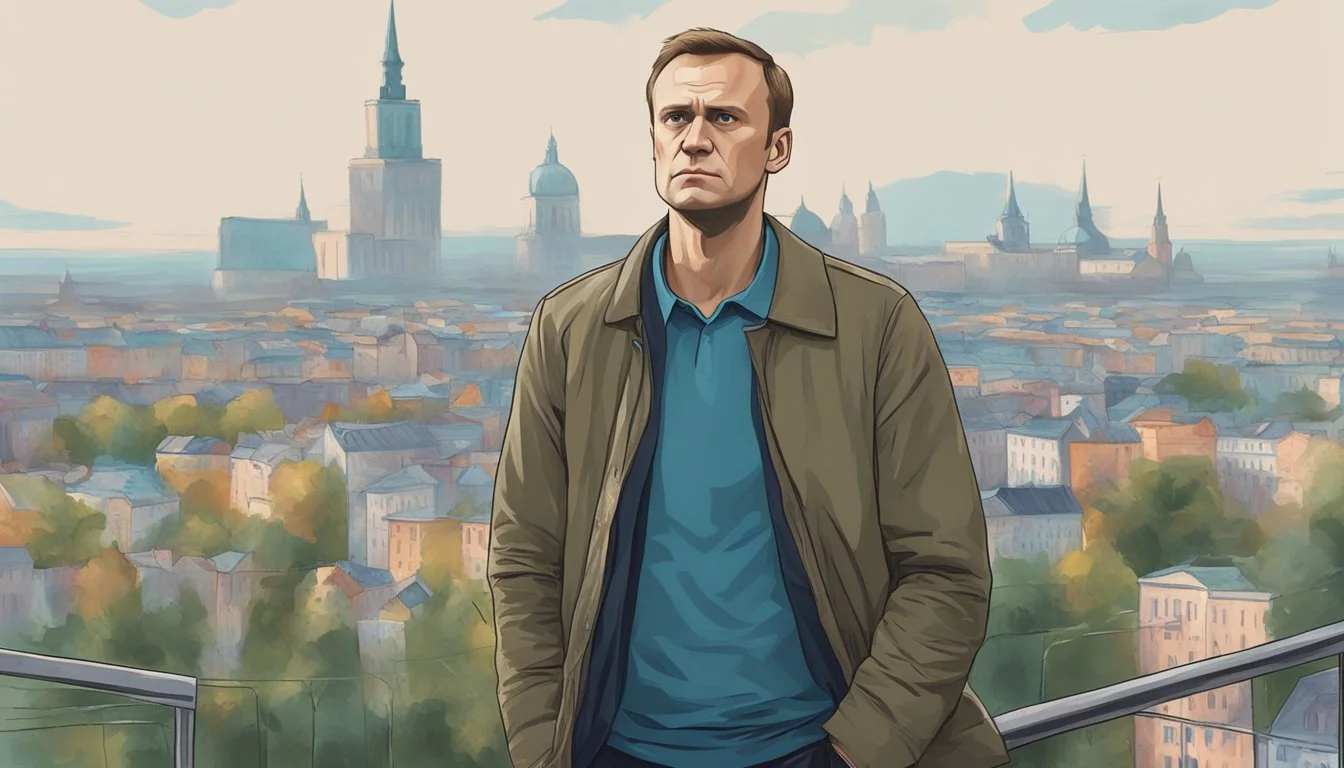Aleksei Navalny: The Journalist Putin Couldn't Silence
A Legacy of Defiance
Aleksei Navalny emerged as a formidable voice against corruption in Russia, fearlessly challenging the Putin regime through investigative journalism and political activism. His unwavering commitment to exposing government misconduct made him a target of relentless persecution. Despite repeated attempts to silence him, including poisoning and imprisonment, Navalny continued to inspire millions and shed light on the inner workings of Russia's power structures.
Navalny's journey from lawyer to opposition leader captivated both domestic and international audiences. His skillful use of social media and video exposes resonated with younger Russians, fostering a new generation of politically engaged citizens. The Kremlin's efforts to suppress Navalny's message only served to amplify his influence and underscore the regime's fear of dissent.
The reported death of Navalny in an Arctic Circle jail in February 2024 sent shockwaves through Russia and beyond. While the circumstances remain contested, his legacy as a tireless advocate for transparency and democracy in Russia endures. Navalny's life and work continue to shape discussions about political freedom, media independence, and the future of opposition movements in authoritarian systems.
Early Life and Education
Aleksei Navalny was born on June 4, 1976, in Butyn, a small village near Moscow. He grew up in a military family and spent his early years moving between various garrisons.
Rise in Russian Politics
Navalny studied law at Peoples' Friendship University of Russia, graduating in 1998. He then pursued a degree in finance at the Financial University under the Government of the Russian Federation.
In 2000, Navalny joined the Russian United Democratic Party "Yabloko". He quickly rose through the party ranks, becoming deputy chief of the Moscow branch in 2004.
Navalny's political activism intensified as he organized protests and campaigns against government corruption. His sharp critiques of the Putin administration gained him a significant following.
Formation of the Anti-Corruption Foundation
In 2011, Navalny founded the Anti-Corruption Foundation (FBK). This non-profit organization aimed to expose corruption among high-ranking Russian officials.
The FBK conducted investigations and published reports on alleged misconduct by government figures. Their work often utilized social media platforms to reach a wide audience.
Navalny's foundation faced numerous legal challenges from the Russian authorities. Despite this, it continued to operate and release high-profile exposés.
The FBK's activities cemented Navalny's reputation as a leading opposition figure in Russia. His work through the foundation became a cornerstone of his political identity.
Navalny's Political Activism
Aleksei Navalny emerged as a prominent figure in Russian politics, challenging the status quo through various means. His efforts spanned organizing opposition movements, running for president, and exposing corruption at the highest levels of government.
Leading Opposition Movements
Navalny played a crucial role in mobilizing opposition forces in Russia. He organized large-scale protests against electoral fraud and government corruption. In 2011-2012, Navalny led some of the biggest demonstrations in Moscow since the 1990s.
He utilized social media platforms effectively to reach millions of followers. His YouTube channel became a powerful tool for disseminating information and rallying support. Navalny's ability to connect with younger generations made him a particularly potent threat to the establishment.
Despite facing numerous arrests and legal challenges, Navalny continued to organize rallies and coordinate opposition activities. His persistence in the face of adversity inspired many Russians to become politically active.
Presidential Campaigns
Navalny attempted to run for president in 2018 but was barred from participating due to a controversial criminal conviction. Many observers viewed this as a politically motivated move to prevent his candidacy.
Despite the ban, Navalny conducted a nationwide campaign. He opened campaign offices across Russia and held rallies in various cities. His campaign focused on anti-corruption measures and economic reforms.
Navalny's presidential bid, though unsuccessful, significantly raised his profile as an opposition leader. It demonstrated his ability to build a grassroots political movement even under restrictive conditions.
Anti-Corruption Campaigner
Navalny gained widespread recognition for his work as an anti-corruption activist. He founded the Anti-Corruption Foundation in 2011, which investigated and exposed high-level corruption in Russia.
His team produced detailed reports and videos revealing alleged wrongdoing by government officials and oligarchs. These investigations often went viral, reaching millions of viewers.
Notable exposés included:
A documentary about former Prime Minister Dmitry Medvedev's alleged hidden wealth
Investigations into President Putin's reported luxury properties
Reports on corruption in state-owned companies
Navalny's anti-corruption work made him a target for authorities but also cemented his reputation as a fearless opponent of government malfeasance.
Confrontations with the Kremlin
Aleksei Navalny's battle against the Russian government involved numerous legal challenges and innovative use of media platforms. His persistence in exposing corruption and rallying opposition made him a formidable adversary to Vladimir Putin's regime.
Arrests and Legal Challenges
Navalny faced repeated arrests and criminal charges throughout his career as an opposition figure. In 2013, he was convicted of embezzlement in a case widely seen as politically motivated. The verdict barred him from running in the 2018 presidential election.
In 2020, Navalny survived a poisoning attempt linked to Russian security services. After recovering in Germany, he returned to Russia in 2021. He was immediately arrested upon arrival and later sentenced to 2.5 years in prison for violating parole terms.
In 2022, Navalny received an additional 9-year sentence on fraud charges. His supporters viewed these legal actions as the Kremlin's attempts to silence its most prominent critic.
Media as a Tool for Dissent
Navalny masterfully used social media and online platforms to circumvent state-controlled media and reach millions of Russians. His YouTube channel became a powerful tool for exposing government corruption.
His 2017 video investigation "He Is Not Dimon to You" accused then-Prime Minister Dmitry Medvedev of large-scale corruption. The video garnered over 40 million views and sparked nationwide protests.
Navalny's team continued to release investigative reports even during his imprisonment. These reports maintained pressure on the Kremlin and kept Navalny's message alive despite his physical confinement.
The Attempt on Navalny's Life
Aleksei Navalny faced a near-fatal poisoning in 2020, sparking international outrage and investigations. The incident exposed the dangers faced by Putin's critics and led to diplomatic tensions between Russia and the West.
Poisoning Attempt and Recovery
On August 20, 2020, Navalny fell severely ill during a flight from Tomsk to Moscow. He was hospitalized in Omsk after an emergency landing. Doctors initially claimed no poison was found in his system. However, Navalny's team suspected foul play and arranged for his transfer to Germany.
Tests at a German military lab revealed traces of Novichok, a Soviet-era nerve agent. Navalny spent weeks in a coma at Berlin's Charité hospital. He gradually recovered and attributed the poisoning attempt to Putin's regime.
International Reaction
World leaders condemned the attack on Navalny. Many called for a thorough investigation and accountability. The European Union and United States imposed sanctions on Russian officials believed to be involved.
German Chancellor Angela Merkel visited Navalny in the hospital, signaling strong support. Then-presidential candidate Joe Biden pledged to hold Russia accountable if elected.
The Organization for the Prohibition of Chemical Weapons confirmed the use of a Novichok-group nerve agent. This finding strengthened calls for Russia to explain the incident and face consequences for the use of a banned chemical weapon.
Imprisonment and Human Rights
Aleksei Navalny's imprisonment highlighted serious human rights concerns in Russia. His treatment in custody and the circumstances surrounding his incarceration drew international attention and condemnation.
Sentencing and Charges of Extremism
In August 2023, a Russian court convicted Navalny of extremism charges and sentenced him to 19 years in prison. This verdict added to his existing sentences, effectively keeping him behind bars for decades. Critics viewed the charges as politically motivated, aimed at silencing Putin's most prominent opponent.
The extremism case focused on Navalny's anti-corruption foundation, which exposed high-level corruption in Russia. Prosecutors claimed the organization incited extremism by calling for regime change.
Navalny consistently maintained his innocence, arguing the charges were fabricated to neutralize his political influence.
Solitary Confinement and Health Concerns
During his imprisonment, Navalny faced harsh conditions, including frequent stints in solitary confinement. He was often denied proper medical care despite serious health issues.
In 2020, Navalny survived a poisoning attempt with a nerve agent. His recovery in Germany led to his arrest upon return to Russia in January 2021.
Reports emerged of Navalny's deteriorating health in prison. He undertook hunger strikes to protest inadequate medical treatment, raising alarms among supporters and human rights organizations.
Global Advocacy for Navalny's Release
Navalny's imprisonment sparked widespread international condemnation. Western governments and human rights groups called for his immediate release, labeling him a political prisoner.
The European Court of Human Rights ruled that Russia violated Navalny's rights and demanded his release. However, Russian authorities dismissed these rulings.
Navalny's supporters organized protests in Russia and abroad, keeping his case in the global spotlight. They used social media to share updates on his condition and amplify calls for his freedom.
Despite mounting pressure, Russian authorities refused to release Navalny or improve his treatment in custody.
Navalny's Influence on Russian Society
Aleksei Navalny emerged as a pivotal figure in Russian politics, galvanizing youth engagement and reshaping public sentiment. His impact extended beyond national borders, influencing global perceptions of Russian democracy and dissent.
Youth Engagement and Public Sentiment
Navalny's charismatic leadership and savvy use of social media resonated strongly with young Russians. His anti-corruption investigations, presented through accessible YouTube videos, attracted millions of views and sparked widespread discussions. This approach energized a new generation of politically active citizens.
Navalny's campaigns mobilized thousands for street protests, challenging the status quo. His "Smart Voting" strategy aimed to unite opposition voters, demonstrating the potential for strategic civic engagement. Despite government crackdowns, Navalny's message of democratic reform continued to inspire many Russians.
Role in Russian and Global Politics
Navalny's activism reshaped the landscape of Russian opposition politics. He became a symbol of resilience against authoritarian rule, persisting despite repeated arrests, attacks, and legal challenges. His return to Russia in 2021, following poisoning, highlighted his commitment to change from within the country.
Internationally, Navalny's struggle drew attention to human rights issues in Russia. His team's continued work after his imprisonment maintained pressure on the government. Global leaders often cited Navalny's case when discussing relations with Russia, making him a key figure in international diplomacy discussions centered on democratic values and political freedom.
The Future of Navalny's Movement
Aleksei Navalny's vision for a democratic Russia continues to inspire activism and shape electoral dynamics. His movement faces challenges but remains a force for change in Russian politics.
Continued Activism and Support
Navalny's supporters maintain a strong presence online and through grassroots organizing. The "Beautiful Russia of the Future" campaign persists, promoting anti-corruption efforts and democratic reforms.
Yulia Navalnaya has emerged as a prominent voice, addressing international bodies like the European Parliament. She calls for stronger action against Putin's regime.
Navalny's team continues to release investigative reports exposing government corruption. These reports garner millions of views, keeping public attention on key issues.
The movement faces increased government pressure. Many activists operate from abroad to avoid persecution. Despite obstacles, they leverage social media and encrypted messaging to coordinate activities within Russia.
Impact on Upcoming Elections
Navalny's "Smart Voting" strategy remains influential in Russian elections. This tactic encourages supporters to vote for candidates most likely to defeat Putin-backed nominees.
The movement aims to field candidates in local and regional elections where possible. However, many opposition figures face disqualification or legal hurdles.
Navalny's ideas shape opposition platforms, with anti-corruption and economic reform as central themes. His supporters work to keep these issues at the forefront of political discourse.
The 2024 presidential election poses a significant challenge. With Navalny's absence, the opposition seeks to unite around alternative candidates or strategies to challenge Putin's rule.
International scrutiny of Russian elections has increased, partly due to Navalny's efforts to expose electoral fraud. This may impact future voting processes and outcomes.



